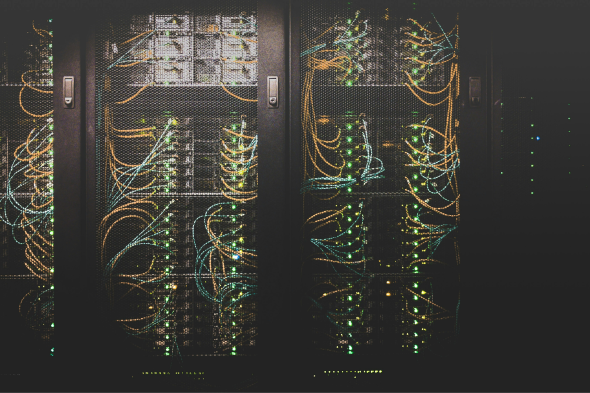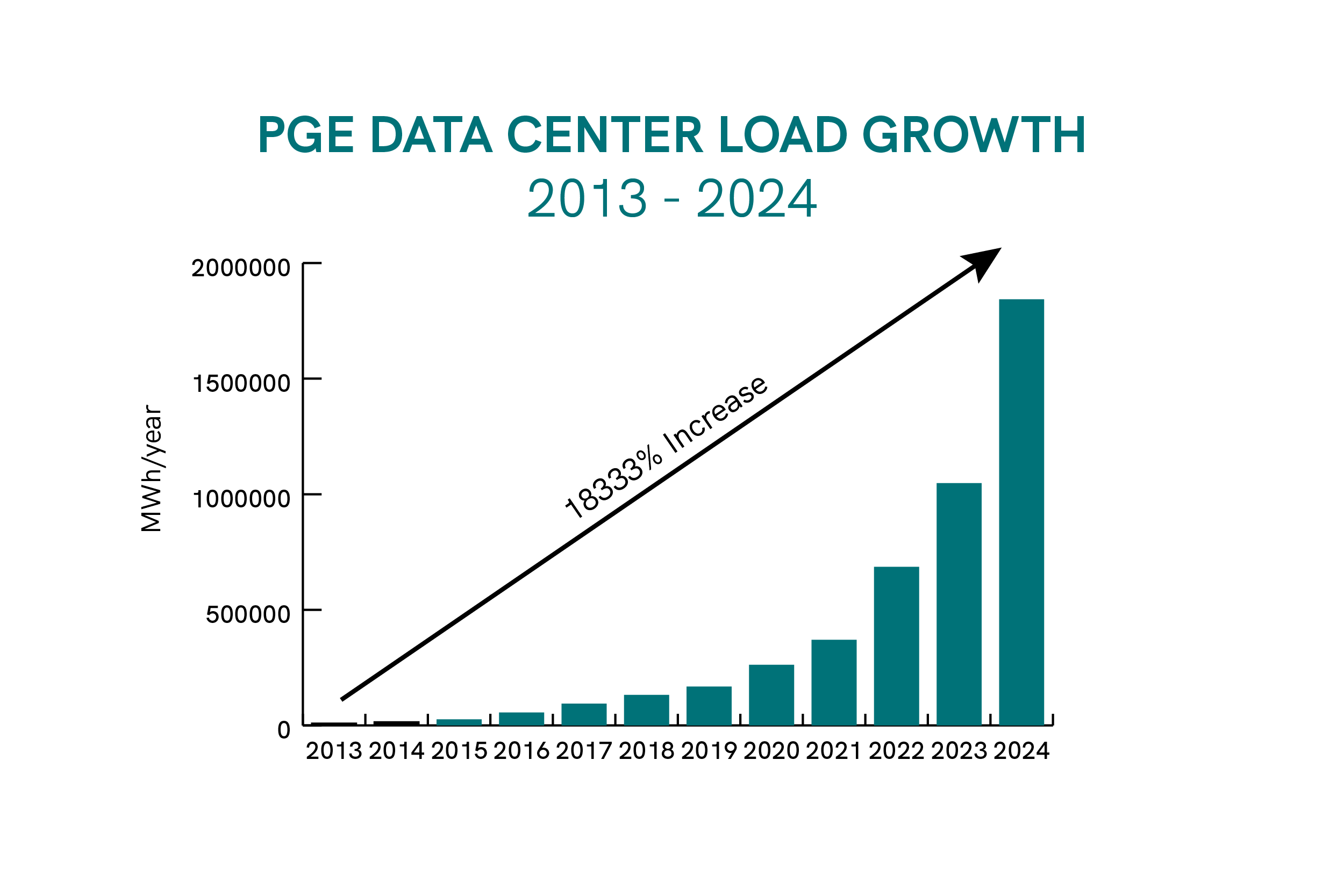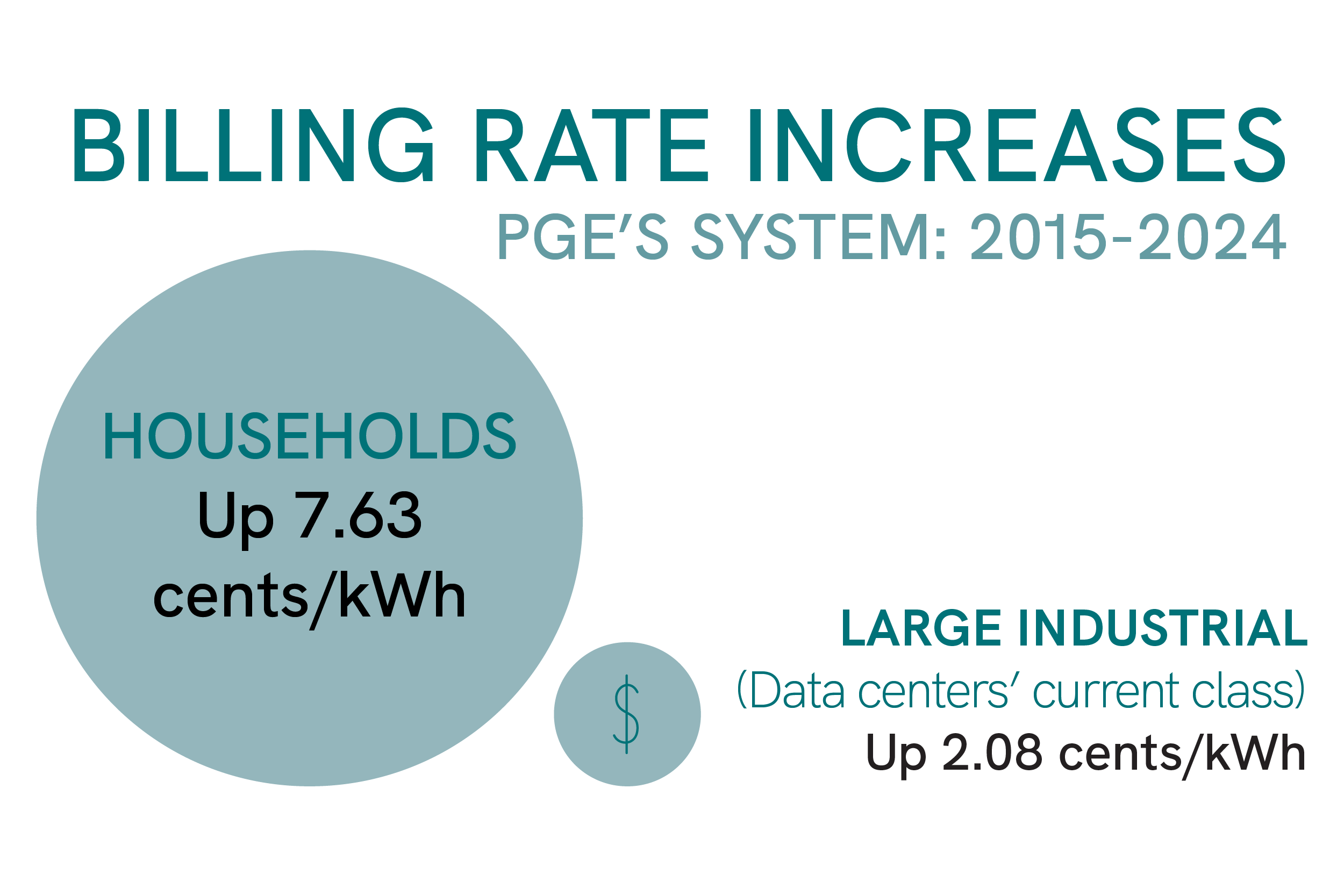Protecting Oregonians With Energy Responsibility (POWER) Act (HB 3546)
Posted on February 19, 2025 by Charlotte Shuff
Tags, Energy, General Interest

Over the past decade, we’ve seen a growing demand for energy in Oregon. No, it’s not people moving here or leaving too many lights on—it’s data centers that are straining our energy grid. This influx of energy demand from just a few large customers is creating a lot of need to change our energy system. But when the companies that are creating the need for these expenses don’t pay their fair share, we do.
This year, CUB and other advocates are supporting a new bill in the Oregon Legislature to hold large energy users accountable for paying for their own energy needs. This means that when data centers’ demand for energy makes a utility invest in expensive changes to the energy system, Oregonians are not the ones paying. CUB is proud to support the Power Act (HB 3546).
Energy Costs: Paying Our Fair Share
The aim of the POWER Act is to ensure that these large customers of for-profit electric utilities are paying their fair share. The bill will impact Portland General Electric, Pacific Power, and Idaho Power customers in Oregon.
The Current Model: Splitting Costs (Mostly) Evenly
When a utility spends money on a new power line, power plant, or other investments, all customers split up the costs. The different categories of customers share some amount of all investments.
There are currently a set number of customer categories for each utility:
- Residential (ex: you!)
- Small Commercial (ex: your local bakery)
- Commercial (ex: your local grocery store)
- Industrial (ex: big factories and very large energy users*)
- Irrigation (ex: farms)
- Street lighting (ex: your city/town)
*Right now, data centers are classified as industrial customers
This system for dividing utility costs worked very well for many years—but times have changed. Customers are divided into different categories because each one has different energy needs and uses the energy grid differently. In the past, all of these different types of customers have grown at about the same pace. It made sense to share the costs because any increase in energy demand was about the same across everyone.
What we’re seeing now is that one type of customer, data centers, is growing at an alarming rate. Utilities are making big investments to meet this demand from data centers, not everyone else. Oregon households and small businesses are not the ones who should be responsible for the rapidly increasing costs.
We Need to Split Utility Costs Differently
In just the last five years, data centers’ growth for just Portland General Electric has been the equivalent of adding 162,400 families to PGE’s system. Since 2016, PGE has seen more than a 95% growth in energy demand from industrial customers, where data centers are currently classified. Meanwhile, PGE’s residential customers’ energy demand has only increased 3.5% since 2016.

Spikes in the energy demand mean big investments from utilities at the cost of customers. When there are massive increases in energy usage, utilities have to build the infrastructure to safely and reliably provide electricity to everyone. We have already seen these costs show up on our energy bills from new substations, battery storage projects, and more.
We’re Already Seeing the Impact of Data Centers on Our Energy Bills
As we have seen significant growth in data centers, we have seen big increases in energy bills. Since 2021, PGE and Pacific Powers households’ bills have increased by nearly 50%. By just October 2024, these utilities together disconnected nearly 53,000 households—the most since reporting started in 2018.
It’s clear that data centers are not paying their fair share. Although we have seen a huge jump in energy demand from these large energy users, industrial customers (their current customer category) have not seen the same increases in billing rates.

With data center demand growing exponentially, we need better guardrails to protect Oregonians from rising energy costs. If these businesses want to use massive amounts of energy, they need to pay their fair share.
HB 3546: Protecting Oregonians With Energy Responsibility (POWER) Act
The POWER Act (HB 3546) seeks to hold large energy users accountable for paying for their own energy needs. This bill requires state regulators to create new policies to help protect Oregon households from paying for the energy needs of data centers, cryptocurrency, and other big tech. It will also make for-profit utilities identify the costs that these large energy users are adding to the system—and make them pay their share. By creating a special category for these customers, regulators can protect Oregonians from covering the cost of these businesses.
We need data centers, cryptocurrency, and other large energy users to pay their fair share. Their demand for energy is creating a greater need to invest in our energy grid but the cost is largely going to everyone else. This bill will help state regulators assign these high costs to only those customers who are making them necessary in the first place.
What the POWER Act Does
HB 3546 creates new rules for regulators and large energy-using customers that meet a set of criteria. For a customer to qualify for this new customer category, they must be a business using 20 megawatts or more and meet certain tech industry classifications*. Data centers and cryptocurrency businesses are the primary businesses impacted.
Oregon Public Utility Commission: Protecting Households and Small Businesses
- Create a new customer category for data centers and cryptocurrency shops starting at 20MW customers
- Protect families and small businesses from costs when bringing these new large energy users onto the grid
- Prevent risk for families and small businesses from paying for the costs of these large energy users
Selected Large Energy Users: Ensuring Energy Investments Are Used & Paid For
- Sign contracts for at least 10 years to ensure expensive investments are worth it
- Pay for the investments that were made to connect them to the grid, even if they use less energy than expected
- Pay an extra fee if they use too much, ensuring excess costs don’t go to households
*For more information on which businesses are impacted by this bill, please refer to the North American Industry Classification System (NAICS)’s code 518210.
The POWER Act Protects Oregonians’ Energy Bills
CUB is proud to support HB 3546 to create stronger protections for Oregon families. We cannot be subsidizing the growth of big businesses on our energy bills.
The POWER Act protects our energy bills, holds data centers accountable, and makes our entire utility system stronger.
Stay Up to Date on Oregon Utility Issues
CUB will continue to advocate for people in Oregon on major utility issues. Sign up for the CUB email list for the latest updates, action alerts, and news on policies that affect the utilities your home relies on.
To keep up with CUB, like us on Facebook and follow us on Twitter!




03/14/25 | 5 Comments | Protecting Oregonians With Energy Responsibility (POWER) Act (HB 3546)